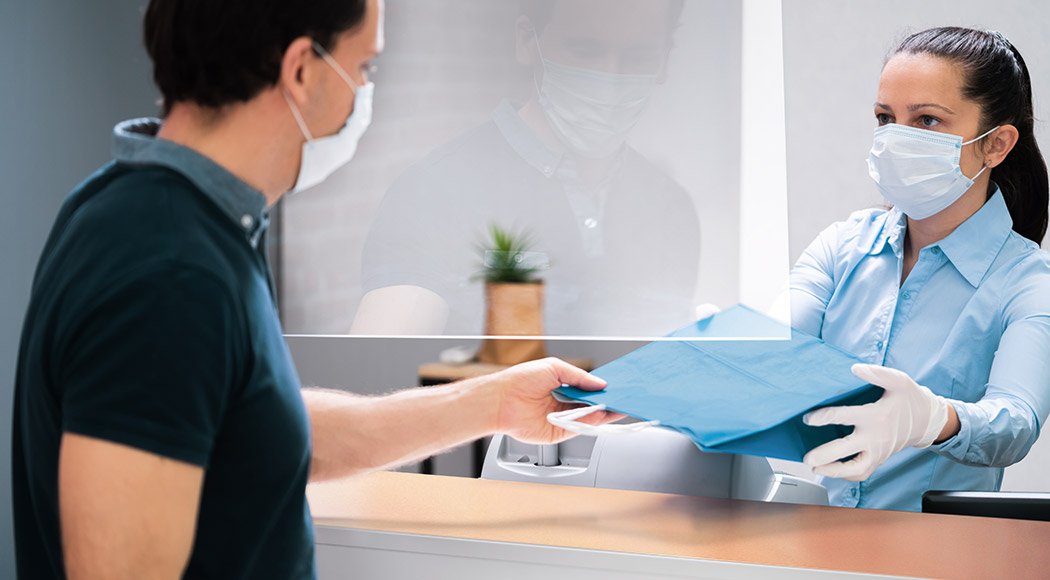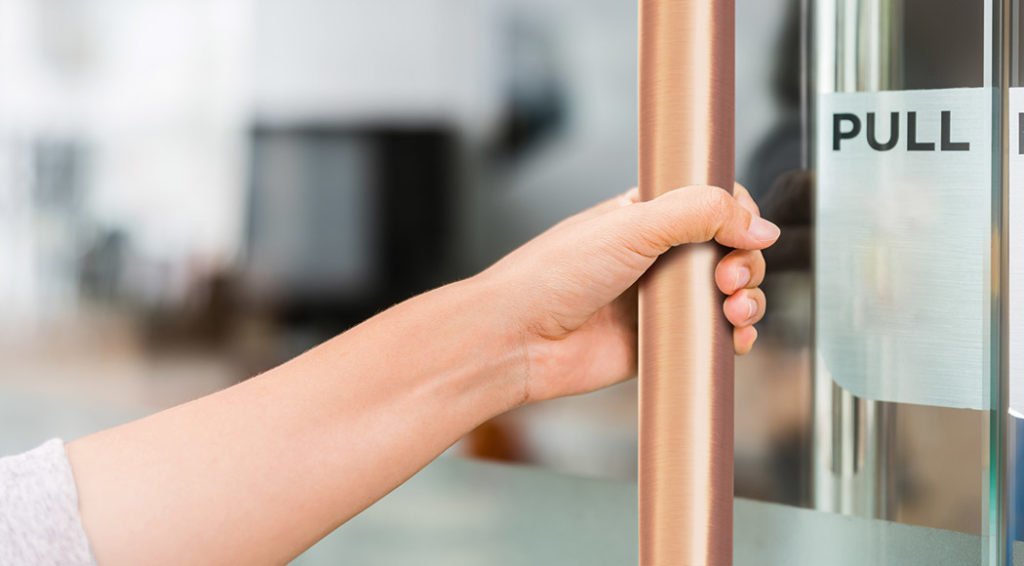How copper antimicrobial surface coverings can help in the battle against COVID-19
COVID-19 has profoundly affected the way we work, socialise and live. We’ve had to adapt to social distancing and the mandatory wearing of face coverings in various indoor settings, to control the respiratory spread of this novel coronavirus.
Another way that the virus easily spreads in society is through contact with a contaminated surface. A person can be infected if they touch a contaminated surface, do not wash their hands or use a suitable hand sanitiser and subsequently touch their face.
How much of a risk are contaminated surfaces for catching COVID-19?
When the virus first emerged, there was a great deal of emphasis placed on the risks posed by contaminated surfaces. Now that time has passed and more studies have been conducted, there’s been a lot of debate recently about how long the SARS-Cov-2 virus can survive on various surfaces.
It’s true that the main way the novel coronavirus is transmitted is when people are near an infected person that coughs, sneezes or talks. However, the risk of catching the disease by touching a contaminated surface with inadequate hand washing is still very much present.
Public areas that are touched frequently by lots of different people, such as counter tops in shops, elevator buttons and handrails among others, are considered particularly at risk of aiding the spread of COVID-19 through contact.
What can businesses do to help stop the spread of the novel coronavirus?
Businesses in many sectors are fighting to stay active and afloat during these extremely challenging times, and those that rely on the high footfall and turnover of people are particularly faced by a difficult dilemma. How can they keep their business going, avoiding huge disruptions and costs while ensuring they are doing everything possible to protect employees and customers from COVID-19?
Most offices, retailers, hospitality and leisure businesses have followed Government guidelines to put vigorous cleaning practices and hand sanitiser stations in place. However, another solution to consider as part of a holistic assessment, is to cover – either permanently or temporarily – those surfaces that have a high touch rate, with an antimicrobial surface covering. An antimicrobial is any substance that effectively kills or stops the growth of microorganisms, including bacteria and viruses.
Why copper is such an effective defence against coronaviruses
The powerful effects of copper as an antimicrobial were known to even ancient civilizations. In fact, people have known about the copper’s disinfectant properties long before they knew that germs and viruses existed. The first known use of copper in this way was back in ancient Egyptian times, when copper was recorded as having extraordinary benefits to health in Smith’s Papyrus, the oldest known medical document, with history tracing back to 3200 B.C.
Copper has been used globally throughout the ages to fight infection. Ancient Chinese civilisations used copper coins to treat heart, stomach and bladder diseases, while age old Ayurveda practices from India advocate the health benefits of drinking water from a copper vessel even to this day.
Other heavy metals such as gold and silver are also antibacterial. But studies have shown copper to be the most effective, all-round antimicrobial, working in the broadest range of environmental conditions.
The antimicrobial properties of copper are also long lasting. In New York City’s famous Grand Central Terminal, copper railings were installed more than 100 years ago. The railings were checked a few years ago by scientists and found to be just as effective as an antimicrobial as they were when first installed.
So, what makes copper such a powerful virus killing agent? It’s all to do with the atomic make up of copper, which offers unique characteristics that make it especially powerful as an all-round, durable and long-lasting antimicrobial.

How copper is being used for infection control around the world
Copper alloy touch surfaces are now being applied across the globe in various settings such as airports, railway stations, train carriages, busses, restaurant kitchens and gyms. The Francis Crick Institute in London, UK, a world-leading research centre for the public good, extensively features copper covered surfaces throughout its facilities. Most recently, one of Latin America’s largest theme parks, Fantasilandia in Chile, has covered or replaced its most frequently touched surfaces with copper in an effort to help control the spread of COVID-19 among visitors.
Various healthcare facilities across the globe including countries such as France, Poland, Peru, Chile and the US are installing copper as an effective infection control method. Several studies have shown that copper dramatically reduces infection rates in hospital settings when installed in areas such as handrails, bed rails, chair arms, call buttons, over-bed tables, IV poles, taps and door handles.
New flexible copper coated surface covering helps protect against COVID-19
Despite all its benefits, the prospect of replacing existing fixtures and fittings with copper ones, especially during these economically difficult times, might seem unachievable. However, new innovations are now available that don’t require a rip out and replace approach.
The advent of innovative, flexible, copper coated thin foil material, such as Alanod’s MIRO® CU makes it easy to temporarily or permanently cover all manner of fixtures, fittings and surfaces.
Just a few millimetres in thickness, MIRO® CU is copper that has been molecularly bonded to an anodised aluminium substrate. This makes it strong and robust yet highly flexible.
With a self-adhesive backing, MIRO® CU can be cut and applied to a huge variety of surfaces without the need for any specialist training or tools. Therefore, the cost of installation is much lower than one might anticipate with fast payback achievable.
MIRO® CU has also been vigorously tested by an independent laboratory, which demonstrated that it reduces the presence of coronaviruses by 99.97%, while maintaining antimicrobial effectiveness over time.
Futureproof the health and safety of your business
No one quite knows when or how the current coronavirus pandemic will end, only that what was once perceived to be just a risk has become a harsh reality the world over.
What is known is that businesses will need to profoundly change their approaches to health and safety for the long-haul. An ancient material like copper, used in very modern ways, can be a highly effective defence against not only SARS-Cov-2, but all other viruses, bacteria and infections that are known, or yet unknown, to humanity.
For further information about MIRO® CU click here

